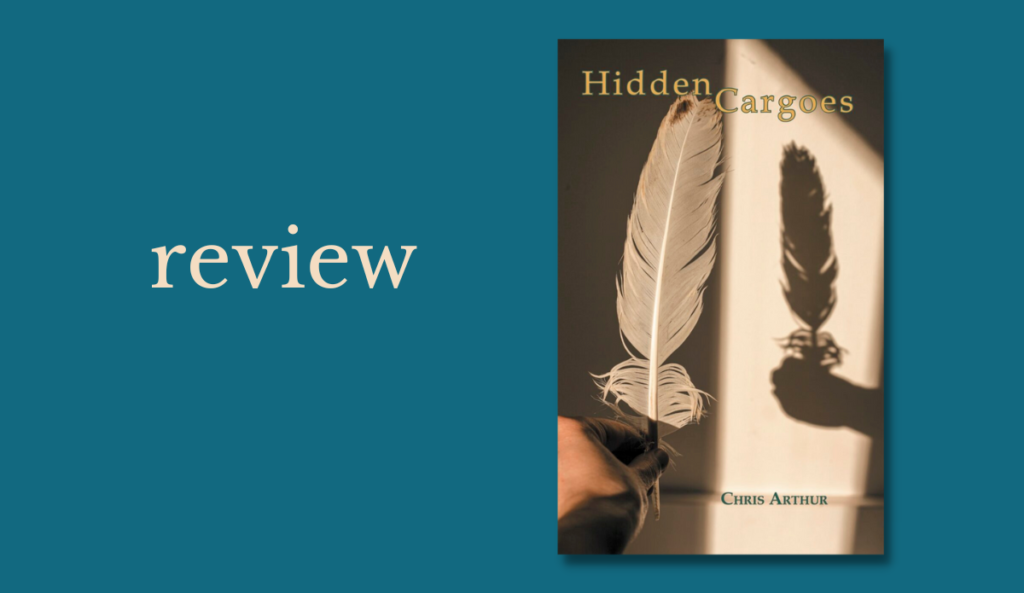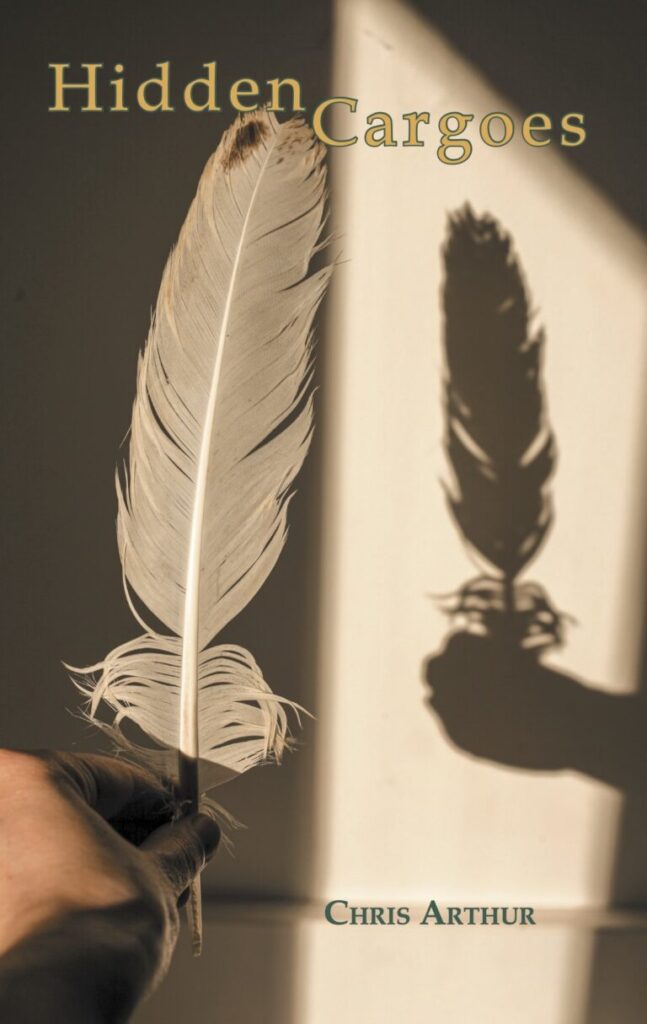
Hidden Cargoes|Chris Arthur|Eastover Press|€18
Wonderment, the engine of discovery, and the nature of language in Hidden Cargoes, by Chris Arthur
by Eoghan Smith
Belfast born Chris Arthur is not only the most accomplished Irish essayist working at present, he also stands among the finest practitioners of the form in the Anglophone world.
A multi-award-winning non-fiction writer, he has been described by Phillip Lapote as ‘one of our greatest living essayists’ and by Robert Atwan as ‘among the very best essayists in the English language today’. His latest collection, Hidden Cargoes, will further cement that deserved reputation.
There has been no shortage of books by Irish essayists in recent years. Notably fine recent examples have been produced by writers such as Róisín Kiberd, Thomas Arnold Fanning, Sophie White, Sineád Gleeson, Emily Pine, Ian Maleney, and Rob Doyle.
Most of these collections fall into the category of the personal essay, where the author primarily charts or reflects on private experience, from which some larger observation about recent historical and contemporary life can be drawn.
With some exceptions, these essays generally tend towards explorations of the social manifestation of the individual self: what people do and how they behave within the confines or otherwise of their relationships, culture or society is the base assumption.
This is well within established traditions: anthropocentrism has been integral to essay writing ever since Michel de Montaigne invented the form in sixteenth century France, in an act of supreme Renaissance humanism.
Philosophical writing
Chris Arthur, however, differs to these newer Irish essayists. His work tends to focus less on the human experience as an endpoint in itself. Instead, to read a Chris Arthur essay is to witness the initial individual experience subtly, almost imperceptibly, fade into the background as the camera pans out to the widest possible lens.
This is philosophical writing in the sense that in the typical Arthur essay, some individual experience or memory, seemingly innocuous at the outset, begins a process of reflection and revelation that prompts a series of ever-enlarging reflections and questions, very often metaphysical in character.
So it is, for instance, in the superb opening essay ‘A Kist O’ Whistles’, that Arthur begins by reflecting on an owl’s skull that he found after a cull of birds in a forest in Country Antrim. The forest surrounds enliven his senses: we learn that he spent hours ‘just being in the place, listening to the sounds, attentive to its sights and smells, savouring its tastes, feeling the sun upon my skin, and the smooth, warm suck and tug of mud as I waded through the marshy ground around the lake’.
Yet soon this quasi-romantic inward attentiveness is re-directed to the owl’s skull and, more precisely, what the skull is (as opposed to, say, what it represents for Arthur): a remnant of a bloodline of an evolving creature that stretches back millenia. In fact, 58 million years or thereabouts: ‘through that stupendous span of time, impulses have travelled along owl nerves…seen as a fingerprint upon the Earth of the history of its kind, it’s so extraordinary it appears miraculous’.
And when Arthur does re-appear in the essay, it is to speculate what he may have meant for the owl: ‘how I would have appeared to it would almost certainly not be in any form I’d recognize as me’. In this way, the individual is transformed through a process of attentiveness, enquiry, and self-distancing.
The hidden cargoes of the title, then, are those objects and instances that, when attended to with care and curiosity, unspool the immense chain of being to which humans and everything they share the world with are tethered to.

Wonderment
Arthur is unapologetic in his emphasis on wonderment, for wonderment, devoid of cynicism, is the engine of discovery. It may be more accurate to say that Arthur’s essays invite re-discovery, that is, the re-discovery of the question of what existence is within the continuum of time.
That wonderment may begin with something as trivial as the provenance of a photograph, or a child’s fascination with a vulture’s egg, or a memory triggered by an old game, but which will end with some of the most immense questions that humans can speculate on: what are the threads of life that connect us to our earliest ancestors? What does it mean to be a finite being appearing randomly on the immeasurable scale of life? How is our understanding of reality shaped by language, our most important invention? What is our relationship with the natural world and how do we curate our understanding of that relationship?
The essays here compel a re-ordering of attitudes to the very world we live in.
Although the twelve essays here are not connected in their subject matter – they range from the inside of a termite’s stomach to the shape of a girl’s ear – they are connected in their method. Part of the joy, then, of reading Arthur is that the reader comes to expect an entire universe of meanings to unfold out of the skull of an owl or even as something as commonplace as a leaf that has blown onto a driveway.
The nature of language
This gradual unconcealment is distilled with a lyrical voice that is precise in word-choice. One of Arthur’s recurrent preoccupations is with the nature of language itself; part of the interest in Hidden Cargoes is found in the attention he gives to the words his essays are comprised of.
This is the case with ‘Letters’, an essay on the extraordinary achievement that is the alphabet. This essay begins with a memory sparked by playing Scrabble with his parents, and which also ranges over the use of the letter K in Kafka, newspeak in George Orwell’s 1984, and the diminution of public discourse on Twitter. And yet, there is a threshold to language beyond which we cannot pass: in ‘Leaf’, Arthur invites us to:
Think of all the tulip tree leaves that have ever existed on this planet, each one hung on its twig…Think of all the insects that have moved across the millions of leaf-acres so constituted, the rivers of rain fallen on them, think of every creature, from dinosaur to human, that has stood in the shade of the Liriodendron, of every footprint on the ground beneath their shading branches. The impossibility of describing sits just below the surface of our fiction. Sometimes our ordinary accounts of things, the stories that we tell, seem like the thinnest of integuments draped over an abyss.
Thus, the mysteries that preoccupy us are preserved and deepened.
Nonetheless, language is the tool of the essayist, and it is apt that two quotes from poets begin Hidden Cargoes. The first by Mary Oliver – ‘to pay attention, this is our endless and proper work’ – could be easily dismissed as bland and imprecise advice. But this ‘paying attention’ – to be alert to what our senses are telling us – is central to Arthur’s approach.
The second, which Arthur includes in the Introduction (an ‘apologia’ of sorts), is by William Blake: ‘to see a world in a grain of sand’. This combination of attentiveness and imagination, or what we might re-categorise as the harmonisation of the sensory and the speculative, are integral to Arthur’s essaying.
It is appropriate then that Arthur also quotes Rebecca Solnit’s idea that essay writing is not just a recounting of things that have happened, ‘but to contemplate what they mean…how the particular connects to the general’. In the superb final essay, ‘Fitting In’, Arthur begins by recounting witnessing a sparrowhawk killing a pigeon, before the essay moves more generally into a reflection on metaphor, essay-writing, and death:
The little drama of my passing will leave the scuff marks of my struggle for a fleeting moment before they vanish and time moves on, its flow containing every pigeon’s hatching, every human’s, every hawk’s, together with the nullity of nonbeing as we all pass into nothingness.
‘To pass’ is the correct verb. After all, the essay, from the French essai – to attempt – implies that failure to fix things in language as they are is built into the form. Arthur notes that passing for Montaigne meant ‘the ceaseless flow that animates everything’.
This humble recognition that there are no easy answers to any questions is characteristic of Arthur’s writing (and Montaigne’s); it is ultimately what ensures that essaying ‘is an ongoing art’. Happily, this can also only mean that we can expect more from Arthur in the future.

Eoghan Smith is the author of The Failing Heart (Dedalus 2018). His second novel, A Provincial Death is out now with Dedalus.











